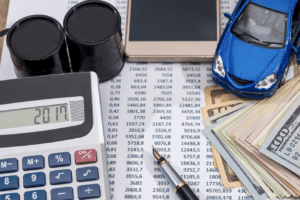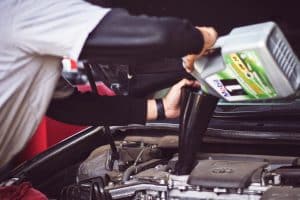Buying a used car from a private seller can be a rewarding experience, offering significant savings compared to purchasing from a dealership. However, it requires careful consideration and due diligence to ensure you make a sound investment. This comprehensive guide walks you through each step of the process, from finding the right vehicle to finalizing the sale, ensuring a smooth and successful transaction.
Is it Safe to Buy a Car from a Private Seller?
Yes, buying a car from a private seller is safe if you take the right steps. Conducting a thorough pre-purchase inspection is essential to ensure the vehicle’s integrity. Verify the seller’s legitimacy, obtain a vehicle history report from CARFAX, and assess the car’s condition to avoid potential issues. Following these precautions helps you make a well-informed decision and reduces the risk of encountering problems.
How can CarInspect Ensure a Safe Vehicle Purchase?
CarInspect offers professional pre-purchase vehicle inspections with a focus on thorough, accurate evaluations. Our services include detailed assessments by certified mechanics, providing you with essential insights and peace of mind before finalizing your vehicle purchase.
- Comprehensive Multi-Point Inspection: CarInspect offers an in-depth 170-point inspection, thoroughly evaluating all critical aspects of the vehicle to uncover any hidden issues or potential problems.
- Convenience of Mobile Service: CarInspect provides mobile service, allowing you to have the vehicle inspected at your location, saving you time and hassle.
- Expert Mechanics: Their team consists of experienced and certified mechanics who deliver a detailed and reliable assessment, ensuring a thorough evaluation of the vehicle’s condition.
Step-By-Step Guide to Buying a Used Car From a Private Seller
This step-by-step guide to buying a used car from a private seller covers essential aspects, from research and planning to finalizing the sale. It helps buyers navigate the process, ensuring they make informed decisions, conduct thorough inspections, and secure a fair deal while avoiding common pitfalls.
1. Research and Planning
Research and planning are vital for buyers who are considering private sales. Thorough research helps you compare options, set a fair price, and understand financing and insurance needs. Proper planning ensures you navigate the process effectively, whether buying from dealers or private sellers.
Identify Your Needs and Budget
Before you start searching for used cars, determine your needs and budget. Consider factors such as:
- Vehicle Type: Do you need a sedan, SUV, truck, or something else?
- Fuel Efficiency: Consider how important gas mileage is for you.
- Usage: Will you use the car for commuting, long trips, or heavy-duty tasks?
- Budget: Establish a price range that includes not only the purchase price but also taxes, insurance, and potential repairs.
Research Vehicle Options
Start by researching different makes and models that fit your needs. Look for reliable vehicles known for their longevity and low maintenance costs. Resources like expert reviews and consumer reports can provide valuable insights into various options.
Set Your Budget
In addition to the vehicle price, include costs for:
- Sales Tax: This varies by location.
- Insurance: Obtain quotes from insurance companies to understand your premium.
- Registration Fees: These fees are usually paid to your local Department of Motor Vehicles (DMV) or similar agency.
- Maintenance and Repairs: Factor in potential future expenses.
2. Find a Private Seller
Finding a private seller involves locating legitimate sellers and assessing private parties. Buyers should seek out individual sellers who are the current owners of the vehicle. Ensuring the seller’s legitimacy helps avoid fraud and ensures a smooth transaction. Use trusted sources and verify the seller’s credibility for a successful purchase.
Search for Listings
You can find used cars for sale from private sellers on various platforms:
- Online Marketplaces: Websites like Kijijiauto, Auto123, Facebook Marketplace, Craigslist, and AutoTrader.
- Community Boards: Check local bulletin boards or social media groups.
- Word of Mouth: Ask friends, family, or colleagues if they know of anyone selling a car.
Contact Sellers
Once you find potential vehicles, contact the sellers to gather more information. Ask for details such as:
- Vehicle History Report: Ensure the car has a clean history and no outstanding liens.
- Current Odometer Reading: Confirm the mileage and compare it with the car’s history.
- Maintenance Records: Request service and repair history to assess the car’s condition.
- Reason for Sale: Understand why the car is being sold, which can indicate potential issues.
3. Inspect the Vehicle
Inspecting the vehicle is crucial for buyers considering a private car sale. Thoroughly evaluating the car helps uncover potential issues and ensures the vehicle’s condition matches the seller’s claims. This step is essential for making an informed and confident purchase decision.
Book a Pre-Purchase Inspection
When buying a used car from a private seller, a crucial step in ensuring you’re making a sound investment is conducting a pre-purchase inspection. This step is essential to uncover hidden issues that might not be apparent during a casual visual check or test drive.
What Does a Pre-Purchase Inspection Involve?
- Visual Inspection: Assess the vehicle’s exterior and interior for damages, rust, and signs of flood damage.
- Mechanical Issues: Evaluate the engine, transmission, and overall mechanical systems for any defects or irregularities.
- Brake System: Check the condition of the brake pads, brake pedal, and brake performance for safety.
- Tires and Wheels: Inspect tire tread, alignment, and overall tire condition for wear and potential issues.
- Steering and Suspension: Examine the steering system and suspension components for smooth operation and wear.
- Gas Pedal and Transmission: Test the gas pedal responsiveness and ensure the transmission shifts smoothly.
- Major Repairs: Identify any recent major repairs and assess their quality and impact on the vehicle’s longevity.
Vehicle History Report
In addition to a pre-purchase inspection, obtaining a vehicle history report from Carfax is important. This report provides detailed insights into the vehicle’s past, including maintenance records, accident history, and any outstanding liens. Together with the inspection, it helps you understand the vehicle’s overall condition and ensures a well-informed purchase decision.
Is a pre-purchase inspection worth it?
4. Negotiate the Sale
Negotiating the sale involves discussing the price and terms of the vehicle purchase with the seller. Buyers should use information from the pre-purchase inspection and vehicle history report to negotiate a fair price. Effective negotiation helps secure a better deal and ensures you’re getting value for your investment.
5. Finalizing the Sale
Finalizing the sale includes completing paperwork, transferring ownership, and handling payment. Make sure all documents, such as the title and sales contract, are properly signed and submitted. Properly finalizing these steps ensures a smooth transition and legal ownership of the vehicle.
Verify the Vehicle Title
Ensure the seller has the vehicle title (also known as the pink slip) and that it’s free of any liens. The title should be in the seller’s name and should match the vehicle identification number (VIN).
Complete the Odometer Disclosure Statement
The seller must provide an odometer disclosure statement, verifying the car’s mileage at the time of sale.
Prepare a Sales Contract
Draft a sales contract outlining the terms of the sale, including:
- Purchase Price: The agreed-upon amount.
- Vehicle Details: VIN, make, model, and year.
- Payment Method: Specify whether you’ll pay by bank transfer, cash, or another method.
- Seller Information: Name and contact details.
Handle Payment and Transfer
Complete the payment as agreed and ensure the seller provides a receipt. Use a secure payment method such as a bank transfer or escrow service to protect both parties.
Transfer Ownership
To transfer ownership, both parties need to complete the following:
- Sign the Title Certificate: The seller must sign the title, and you must ensure all required sections are filled out.
- Submit the Title Transfer: Visit your local DMV or motor vehicle office to submit the signed title and other necessary documents. This process varies by location.
Register the Vehicle
Apply for a new registration and license plate in your name. Provide proof of ownership, proof of insurance, and any other required documents. You’ll also need to pay any applicable sales tax, registration fees, and other costs associated with the purchase.
Common Scams to Avoid When Buying a Car From a Private Seller
Buying a used car from private sellers in Canada can be a great way to save money, but it also comes with the risk of scams. Here are some common scams to watch out for:
- Fake Private Sellers (Curbstoning): This scam involves unlicensed dealers pretending to be private sellers to sell cars without disclosing hidden issues. These vehicles often have undisclosed accidents, odometer tampering, or other hidden defects. Always verify the seller’s identity and check the car’s history with services like Carfax.
- Title Washing: Some sellers try to hide a car’s past, such as salvage or flood damage, by manipulating the title in different provinces with less stringent rules. This makes the car appear damage-free. To avoid this, review the car’s history report for inconsistencies or suspicious changes in ownership locations.
- Odometer Fraud: Scammers roll back the odometer to show fewer kilometers than the car has actually driven, making it appear more valuable. Verify the odometer reading with maintenance records and have a trusted mechanic inspect the car’s condition compared to its mileage.
- As-Is Sales Without Disclosure: Some sellers may push cars “as-is” without revealing known problems, leaving buyers with unexpected repair costs. Always request a pre-purchase inspection from a certified mechanic and be cautious of sellers who refuse this step.
- Fake Escrow Services: Scammers may propose using fake escrow services to hold your payment, creating a false sense of security. These services are often fraudulent, and once you pay, both the money and the seller disappear. Stick to well-known, reputable escrow services and verify their authenticity independently.
- VIN Cloning: Stolen vehicles are given new identities by swapping their Vehicle Identification Number (VIN) with that of a legal car. This can leave buyers unknowingly driving stolen property. Always compare the VIN on the vehicle with the documents and check it against reliable VIN-checking services.
Being aware of these scams and taking steps such as verifying the seller, checking vehicle history, and insisting on inspections can help protect you from fraud when buying a used car in Canada.
Book a Pre-Purchase Inspection in Canada
At CarInspect, we’re dedicated to ensuring your peace of mind with our pre-purchase vehicle inspections. Our team of certified mechanics provides a thorough evaluation of each vehicle, offering detailed insights into its condition. We bring our comprehensive services directly to you with our convenient mobile inspections, saving you time and effort.
Our services are available in the following cities in Canada:
- Montreal
- Toronto
- Vancouver
- Edmonton
- Calgary
- Halifax
- Winnipeg
- Gatineau/Ottawa
- Quebec city
- Kelowna
- And much more!
With CarInspect, you can confidently make informed decisions and avoid costly surprises, ensuring your next vehicle purchase is a sound investment!









